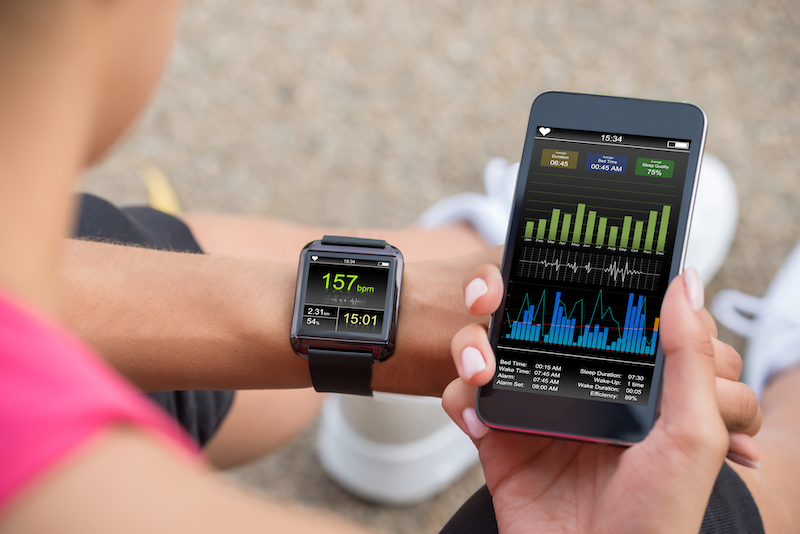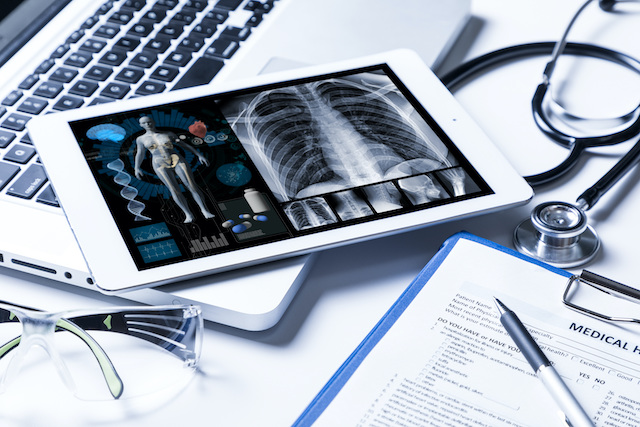In the healthcare industry, data is the key to innovation. Without doubt, it opens up new opportunities for improved, more informed healthcare. Data scientists and machine learning engineers around the world strive to find ways to collect and process a high volume of healthcare data to further interpret and use it for medical discoveries. In this article, we take a look at several areas where data science can benefit healthcare. But first, let’s address a few obvious questions.
Why is data important in public health?
Machine learning programs help doctors make more informed decisions and prescribe the best treatment possible. For example, patients can use wearable devices, which lets doctors have a full picture of the disease and automatically assess a patient’s condition not only during an appointment but also between visits.
Ultimately, all innovations in healthcare are needed to improve the quality and reduce the cost of medical care. Data science allows the doctor to spend more time with the patient, while the machine analyzes the data set quickly and accurately. Data scientists here take part in the creation of smart systems and are actively engaged in the process of invention.
Health data science: Who’s ahead of the curve?
Among tech giants, those are Google Health and IBM. The latter has created a line of solutions under the IBM Watson brand, which is now actively used in healthcare. The IBM Watson Health toolbox includes the platforms for oncology, cardiology, radiology, and other areas of medicine. Google Health, on the other hand, was designed to create a repository of health records and data in order to connect doctors, hospitals, and pharmacies directly.
1. Data Science in Healthcare: Medical image analysis
With the help of data science, medical image interpretation has come to fruition. Leveraging data science in this field opens up countless methods for determining the difference in the modality, the dimension of the images, and the resolution. Those include X-rays, computed tomography, magnetic resonance imaging (MRI), and mammography. Many new tools are underway to provide extremely accurate means of extracting data from the images with the highest quality. The deep learning algorithms offer detailed diagnoses with competent interpretation.
Mathematical methods and machine learning will help to significantly simplify and expedite diagnosis, especially in the early stages. Diagnoses will be more accurate, established in a short time, meaning that there will be more chances to save a patient’s health and life.
How AI improves the quality of image evaluation can be seen in radiology. Every day, doctors use their experience and knowledge to draw the right conclusions from images. With thousands of images that have been processed and marked by a healthcare professional, data scientists can train the neural network to recognize deviations in new images. A neural network model trained on a massive image collection from a database can analyze the picture and conclude if there is a disease.
2. Wearables

The human body generates terabytes of data daily and technology allows us to gather most of it. This way, scientists get access to high volumes of data like heart rate, calories burnt, blood pressure, glucose levels, and more. This information plays a vital role in innovative health monitoring. Machine learning helps analyze heart beating or breathing patterns and can detect changes, predict deviations, and transmit them to hospitals. Wearables are also the key to chronic disease prevention. Smart devices collect and process behavioral data to create and adjust individual health programs.
3. Data science meaning for drug discovery
Machine learning presents an excellent opportunity for the biochemical and pharmaceutical industries. Traditionally, a single formula undergoes multiple tests before it’s approved. In most cases, the formula is rejected, despite all the time, effort and money invested.
With data science, the process can be shortened and become much more efficient. Machine learning algorithms add steps for the initial screening of each component and can predict success rates based on various biological factors. Instead of opting for laboratory experiments, technology is applied to create simulations and further develop mathematical models for analysis.
4. Big Data in healthcare: Genetics and genomics
Advancements in genetics and genomics create many ways for personalized treatment. We can analyze the influence of DNA and the reaction of various medications to a person’s health with regard to their biological compounds.
Data science promotes the integration of various data into the genome. Such an in-depth analysis enables efficient disease research. A good example of using data science in this field is Deep Genomics, a project that builds life-saving genetic therapies. It is making a remarkable contribution to predicting the molecular effects of different genetic and DNA interpretations. This way, researchers can predict how genetic variations will affect the genetic code.
5. Incidental disease findings
Data science brings a lot of value to the undiagnosed disease discovery. Doctors usually consider tests and images in light of the problem the patient came with. A machine can distinguish other diseases and abnormalities, for example, it can identify lung cancer in an image of a fractured rib. Essentially, machine learning in healthcare is here to help doctors examine a patient for all possible diseases after only one visit.
Read Also: TRENDS IN HEALTHCARE 2020: GET READY FOR DIGITAL TRANSFORMATION
6. Data science in MRI
AI capabilities are applied increasingly in magnetic resonance imaging. Evaluating images obtained with this method can be time-consuming. During one study, doctors get dozens of images. To help the doctor analyze this data, scientists interweave AI into MR scanners, which evaluates the quality of images and compares the results with the previous indicators to identify the dynamics of the disease.
7. Data science and pathomorphology
In oncology, an accurate diagnosis can be made in the only way – by analyzing the tissue through a microscope. To help pathologists, data scientists create algorithms for processing cell images, similar to those that recognize people and identify objects in pictures. These are specialized medical decision systems that detect and classify the affected cells, and then inform the doctor about their findings. Besides, the specialist immediately receives additional information like the concentration of cells, the stage of the disease, the characteristics of intracellular processes, and more, which helps immensely in diagnosing.
8. Virtual support for patients
In light of the pandemics, the global health organization aims to make efforts to limit patient visits to the hospital, moving everything to virtual platforms. With Al-Integrated tools, patients can do doctor visits virtually and interact with therapists online through voice and video calls. Many chronic health conditions can be monitored virtually and with a due level of efficiency. Patients can interact with AI chatbots and receive efficient health solutions.
9. Predictive medicine
Data science is widely applied in predictive analysis. Researchers collect patient data, find correlations, analyze clinical notes, associated symptoms, habits, family disease history to make predictions. In addition, biomedical factors, including clinical variables and genome structure, are used to make the prediction and identify the development of certain diseases. Reducing risk is the ultimate goal of data science in this field.
10. Manage customer data
Dealing with patient data has become much more convenient thanks to data science. The entire paperwork is shifted to digital data. Data scientists can back up the records digitally and use the data for many discoveries and inventions. In this field, optical character recognition and vector machine are the two very helpful techniques.
Each health organization implements different techniques to make progress in collecting patient records. While some offer online accounts, others distribute electronic cards to record all of the data individually.
Wrap up: Looking for a healthcare data scientist?

As we can see, data science is disrupting the healthcare industry in many ways. One of the key fields in this discipline is machine learning. We come across machine learning algorithms several times throughout the day. Think navigators, movie and purchase recommendations. To name a few, machine learning is used heavily in security, logistics, risk management, trading, insurance, and much more.
Circling back to healthcare, health-related information offers a foundation for doctors and researchers to use as a basis in their research. It creates a solid foundation for carrying out the evaluation and producing more effective drugs. It fosters better communication between patients and doctors. Finally, it improves the overall quality of health services by providing more in-depth insight into a patient’s health report and their response to a particular drug. That requires a close-knit collaboration between doctors and data scientists.
Many businesses worldwide have come to realize that data is their biggest asset. That is the reason why data scientists are in high demand nowadays. Pushing the search outside your location, you can find a wealth of data science experts. Our specialists from NCube will help you build a team of skilled data scientists and machine learning specialists. They possess the necessary knowledge and field-relevant experience to solve problems that involve Big Data. Let’s connect?
